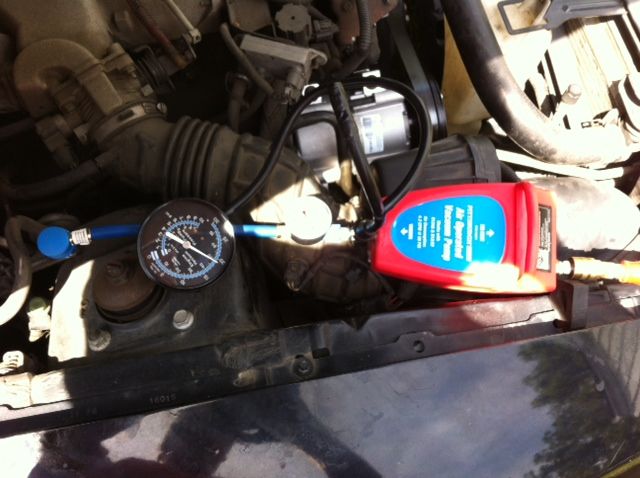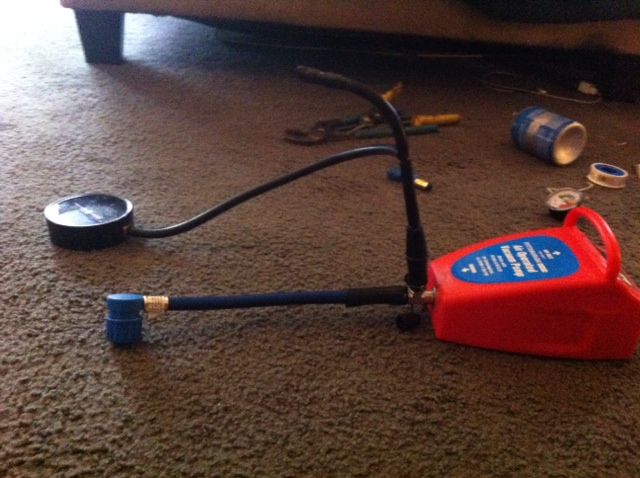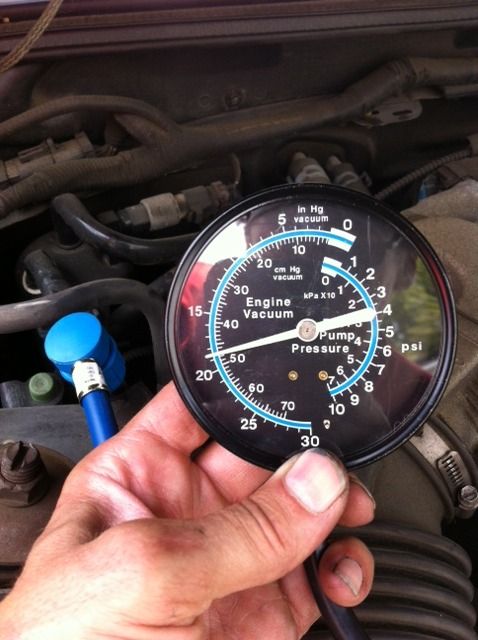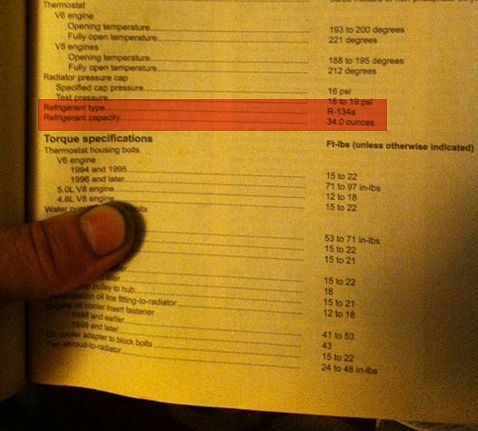

|
| Search | Car Forums | Gallery | Articles | Helper | AF 350Z | IgorSushko.com | Corporate |
|
| Latest | 0 Rplys |
|
|||||||
| Engineering/Technical Ask technical questions about cars. Do you know how a car engine works? |
 |
 Show Printable Version | Show Printable Version |  Email this Page | Email this Page |  Subscribe to this Thread
Subscribe to this Thread
|
|
|
Thread Tools |
|
|
#1 | |
|
AF Newbie
Join Date: Jul 2017
Location: Richmond, Virginia
Posts: 3
Thanks: 0
Thanked 0 Times in 0 Posts
|
AC Clutch Short Cycling
2000 Ford Mustang 3.8 liter 6 cylinder
The AC clutch in the mustang went bad about a year ago so we took it out and installed an idler pulley in it's place until present. Went to Advance Auto Parts today and bought a new AC compressor. Vacumed out the system before I added R134. The vacum was holding rock steady at around 19 Hg. No leaks in the system. So I turned on the car and put the AC on Max Cool full blast and noticed the clutch did not come on. Figured it needed a charge so I added 134 and it took a charge real good with that vacum in place. So the clutch finally came on but now it's short cylcling. It only stays on for a like a second or two and switches back off. The pressure rises to like 55psi then the clutch cuts on for a second and the pressure drops quickly to like 20psi with the clutch on then the presssure rises again to the same thing like around 55 psi (almost in the red zone according to the gauge), the clutch comes on for a second, pressure drops again rapidly then rises back up. Over and over. When I was installing the compressor I didn't realize it was full of oil and when I tipped it down to get it on the mount most of the oil in the compressor spilled out. I've found that the auto parts store carries ac compressor oil that can be added through the low pressure port. I don't think that's the problem though. I thought maybe the pressure was too high so I let out a bunch of 134 till the gauge read around 30 psi and so the clutch would come at the high point of 30 psi, drop to like 10 psi, clutch would cut off then it would rise back up to 30 psi and do it all over again. I added and discharged 134 back and forth and tried out different pressures but no luck. Still short cycles. One thing is consistant though. When the clutch does come on at the max charge I have in it, it drops consistently around 20 or 25 pounds from the high point then rises back up again. If I got a 55 psi charge in it then it drops to like 30 psi before it rises again. If I got a 40 pound charge in then it will drop to like 15 psi before it starts to rise again. Anyone got any idea what it might be? The pressure switch? |
|
|
|

|
|
|
#2 | |
|
SHO No Mo
 Join Date: Jun 2004
Location: Cedar Rapids, Iowa
Posts: 10,978
Thanks: 103
Thanked 354 Times in 347 Posts
|
Re: AC Clutch Short Cycling
So when you first charged the system did you pay attention to the capacity (should be a label under the hood) and charge to that amount, or did you just wing it based off of pressure? When you evacuated the system how long did you let it sit under vacuum, and how long did you hold the vacuum with the pump turned off to confirm no leaks?
The previous pump that failed, how did it fail? If the pistons or rings failed, did you replace any of the other parts that likely got plugged with junk from the failing compressor? -Rod |
|
|
|

|
|
|
#3 | ||
|
AF Newbie
Thread starter
Join Date: Jul 2017
Location: Richmond, Virginia
Posts: 3
Thanks: 0
Thanked 0 Times in 0 Posts
|
Re: AC Clutch Short Cycling
Quote:
No I did not pay attention to the capacity. This is the first time I've ever done this and I had no idea how much it was gonna take. I only got about 1/2 of a 12oz can in there when the charge gauge was showing it was in the red zone. I do not have a full set of gauges as I'm trying to do this on the cheap and I was using the gauge from a 134 can. From looking at a Youtube video, with a completely empty charge it should take around 22oz which would be a can and a half. So why is the gauge going into the red zone at only 1/2 a can? I let the vacuum run on it for about 30 to 45 minutes before I turned it off. My vacuum setup would only pull down to 20Hg. I'm using one of those Harbor Freight gadgets that reverses the flow of an air compressor. After I turned off the vacum I only let it sit under vacuum for about 10 minutes before I thought it was good and then I proceeded to turn on the car and charge the system. Also.. from the Youtube video it says not to charge the 134 to fast into the system at first or the refrigerant will turn to liquid and mess up the compressor. When I first turned on the car and the clutch didn't come on I just squeezed the trigger and shot the 134 in at full blast. I hope didn't mess nothing up. I feel like I wanna start over from scratch and evacuate the system again and add the oil back in that spilled out when I charge the system up from a fresh start. A sticker on the bag the new compressor came in said it had 6oz of oil in it. I figure at least 4oz spilled out. In regards to old the compressor, it was the clutch that went bad on that one. It would squeal when on and I after I got it apart I found the clutch all rusted up real bad and it had some mechanical components bad on it. Harbor Freight vacuum setup:  Closer look of Harbor Freight air compressor vacuum with a vacuum gauge attached:  After detaching vacuum the gauge said it was holding steady at around 19Hg:  Last edited by Toddo77; 07-25-2017 at 08:42 PM. |
||
|
|

|
|
|
#4 | |
|
SHO No Mo
 Join Date: Jun 2004
Location: Cedar Rapids, Iowa
Posts: 10,978
Thanks: 103
Thanked 354 Times in 347 Posts
|
Re: AC Clutch Short Cycling
If it held vacuum, even 20 inHg, for 10 minutes after you stopped running the pump, that is a good sign that you don't have a leak. With that amount of vacuum though I would have expected that it would take the full can of R-134a rather easily. And as you pointed out, if your system is supposed to have 22 oz of R-134a, you wouldn't have a very effective system with only 12 oz in it. Probably the only way you'll know if the charge is right if you don't have a manifold gauge set would be to start over from scratch and put in almost two cans. However, as far as I'm aware, it is still illegal to vent R-134a in to the atmosphere. There is some legal loophole that allows an unlicensed consumer to purchase R-134a, but that still doesn't make it legal to intentionally vent it.
Depending on how badly you want your A/C working, you might be better off to take it to a shop at this point, explain what you've replaced and that you've confirmed the system holds a vacuum. The shop will still need to recover the R-134a that's in it and evacuate the system in order to charge it, but at least they know it will be a tough sell to try to convince you there is a leak somewhere. -Rod |
|
|
|

|
|
|
#5 | ||
|
AF Newbie
Thread starter
Join Date: Jul 2017
Location: Richmond, Virginia
Posts: 3
Thanks: 0
Thanked 0 Times in 0 Posts
|
Re: AC Clutch Short Cycling
Quote:
If you have an air compressor already then you won't need an expensive vacuum pump according to the Youtube video as Harbor Freight makes a cheap $17 vacuum device that works with any standard air compressor. As far as the vacuum gauge goes to measure your vacuum, you can get by with a relatively inexpensive Actron brand engine vacuum gauge. With some ingenuity and some various diameter hoses that can be squeezed inside one another obtained from any auto parts store, the Actron engine vacuum gauge, the cheapy Harbor Freight vacuum device and a hose cut off from a R134 can that has the low pressure quick connect fitting, you have everything you need to evacuate your system and measure the vacuum and test for leaks. After you determine that you're holding a vacuum and you have no leaks, you just add the correct amount of 134 no matter what the 134 can gauge is saying. Don't let the gauge fool you. If your vehicle info says your ac system takes 22oz and you know you're working from a complete vacuum, then you add 22oz no matter what. I went to my Haynes manual to find the refrigerant capacity because there were no info stickers under the hood on the capacity for my vehicle. The 2000 Ford Mustang actually takes 34oz of refrigerant:  Since I now knew my capacity, and I knew that I had less than a 1/4 of the 134 in the system than it needed, that told me that the symptom of the short cycling clutch was because of the most common reason for a short cycling clutch. Low refrigerant. Not near enough 134. So I went out and put a whole 12oz can more in and disregarded the little 134 can gauge and low and behold, the clutch started cycling longer and longer. So right now I still only have about 20oz total of 134 in (ran out) and the air coming out of the vent is already pretty cold. Gotta put one more can in and after that the air should be ice cold. After I get in the correct amount of refrigerant in then I'll see what the 134 can gauge is reading and take it from there. Tip for everyone: If you're installing a new ac compressor, don't take off the cover of the ports and spill all the oil out of the compressor tipping it down getting it onto the compressor mount on the engine!! |
||
|
|

|
|
 |
POST REPLY TO THIS THREAD |
 |
|
|